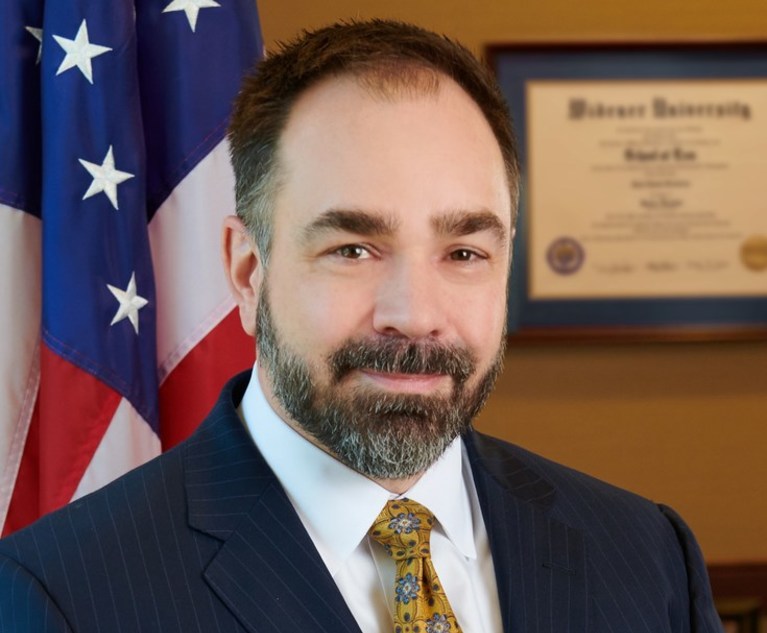On Nov. 2, Pennsylvanians are set to decide which candidate will join the ranks of the state Supreme Court. To get a better understanding of each candidate’s background and judicial philosophy, The Legal has asked each to respond to a questionnaire touching on a variety of topics important to the legal community.
Responses to the questionnaires are set to be published in the weeks leading up to the general election. The first installment comes from candidate P. Kevin Brobson, president judge of the Commonwealth Court.
The following has been lightly edited for style.
The Legal: How would you describe your judicial philosophy?
Brobson: I will approach every case that comes before me with an open mind and without bias. The role of judges is to apply precedent faithfully to the facts of the cases before them, to strictly apply the law as written, and to leave personal bias and political whim out of the courtroom. In a broad sense, this is what all Pennsylvanians desire of their judges.
The Legal: What two decisions or cases are you most proud of, and why? Conversely, what two opinions or cases would you like to take back or revise if you could, and why?
Brobson: I have authored many opinions in many different areas of the law over my nearly 12 years as a trial court and appellate court judge on the Commonwealth Court—e.g., probation and parole, prison conditions, Megan’s Law/SORNA, land use and zoning, driver’s license suspensions, personal injury, trusts and estates, state and local taxation, professional and occupational licensing and discipline, workers’ and unemployment compensation, environmental regulation and permitting, election regulation, right-to-know law, insurance company insolvency/receiverships, public education, discrimination, labor and employment disputes, and others.
By way of example, in MFW Wine v. Pennsylvania Liquor Control Board, I granted summary declaratory and mandamus relief, directing the Pennsylvania Liquor Control Board (PLCB) to implement a direct special-order wine shipment program consistent with Act 39 of 2016. The case was significant for two reasons. First, it arose out of the closure of PLCB facilities in 2020 in response to the COVID-19 pandemic. Second, as a trial judge in the case, I presided over the first virtual, live-streamed evidentiary proceeding in Pennsylvania.
Another example is League of Women Voters v. Commonwealth. Upon the Pennsylvania Supreme Court’s exercise of extraordinary jurisdiction over action in Commonwealth Court’s original jurisdiction challenging the constitutionality of Pennsylvania congressional districts, President Judge Mary Hannah Leavitt appointed me to preside over an expedited bench trial and to issue recommended findings of fact and conclusions of law to the Supreme Court. This case was significant for several reasons. First, my staff did an outstanding job under a very tight timeline in helping me to prepare for the trial and to prepare and finalize my report and recommendation to the Supreme Court. Second, the lawyering was excellent. Counsel was very prepared and responsive. They helped make the trial go very smoothly. Finally, I appreciated what the Supreme Court wrote about me in their decision on the merits:
“The Commonwealth Court, by the Honorable P. Kevin Brobson, responded with commendable speed, thoroughness, and efficiency, conducting a nonjury trial from December 11 through 15, and submitting to us its recommended findings of fact and conclusions of law on December 29, 2017, two days prior to our deadline.”
In terms of opinions or cases I would like to take back or revise, I am sure there are if I looked back at my 12-year judicial career. I am human and made the best decisions I could at the time. It would be wrong of me, however, to undermine prior decisions in response to this question. I can say only that in every decision I have issued for the court, I did my best to be fair and apply the law to the facts in the case. I continue to do that today and, should I be fortunate enough, will do that as a Pennsylvania Supreme Court justice.
The Legal: In your view, what makes you the best candidate for the role?
Brobson: With nearly 12 years of service, I am a veteran appellate and trial court judge who understands that all Pennsylvanians deserve to have faith in a fair and impartial judiciary. If elected, I would be the only justice that has served as a Commonwealth Court judge. In this respect, I will add a new voice and a new perspective to the Supreme Court—a justice who has dedicated a career to ensuring that government follows the law and protects the constitutional rights of our citizens. In addition to receiving the Pennsylvania Bar Association’s highest rating in this election, the Supreme Court appointed me to serve as the sole appellate judge member of the Pennsylvania Judicial Conduct Board, the body charged with investigating judicial misconduct. There, the members elected me to serve as chair. Most recently, my colleagues on the Commonwealth Court elected me to serve as court’s president judge. I thus have the judicial, administrative and leadership experience to be a Pennsylvania Supreme Court justice.
The Legal: What is the greatest threat to the practice of law, or problem the profession faces?
Brobson: The largest challenge facing the profession in the near term is adjusting to a changed landscape in the delivery of legal service in a post-pandemic environment. We face similar challenges in the judiciary. Many of the measures taken by the profession and by the courts—i.e., telework, use of advanced communication technology (ACT), etc.—are likely, in some form, to remain in place post-pandemic. The challenge for both the courts and the profession is to find the sweet spot, where we return to some form of pre-pandemic normal while taking advantage of the lessons learned over the last 21 months.
The Legal: What does your party membership say about you and your legal outlook?
Brobson: Nothing. Rather, my nearly 12 years of service as a trial and appellate court judge, the most of any candidate in this race, and the trust and confidence of those I have worked with over the years, speak volumes about my approach to judging and the law: (1) an appointment by the Pennsylvania Supreme Court to serve as the only appellate judge member of the Pennsylvania Judicial Conduct Board; (2) my election by the members of the JCB to serve as the chair of that body; (3) an appointment by the Pennsylvania Supreme Court chief justice to chair a special committee to examine the ethics advice process for judges; (4) my election by my colleagues to serve as the 10th president judge of the Commonwealth Court; and (5) the highest rating of “highly recommended” by the Pennsylvania Bar Association Judicial Evaluation Commission for this Supreme Court election.
This is a record of nonpartisanship that I am proud of.
The Legal: In light of the recent constitutional amendments approved by voters, what is the court’s role in defining or limiting the emergency powers of the governor and General Assembly?
Brobson: The role of the courts is to resolve disputes. Should a dispute arise over either the governor’s or the General Assembly’s actions and that dispute finds its ways into the courts, the role of the courts is to decide those disputes in accordance with the law, whether found in regulation, statute, or the Pennsylvania Constitution. I have handled many such disputes over my nearly 12-year career.
The Legal: Do you think courts in Pennsylvania have a perception problem when it comes to appearing partisan? If so, what would you do to combat this?
Brobson: Some Pennsylvanians believe that our Pennsylvania Supreme Court has issued decisions in recent years that appear to have a partisan slant. All Pennsylvanians desire and deserve to have faith in a fair, impartial, and nonpartisan judiciary. The concerns of these Pennsylvanians, therefore, should not be lightly dismissed. I hope my election as the next justice of the Pennsylvania Supreme Court will help to combat some of this, although I am not so naïve to think the election of one new justice would make it disappear. My election would preserve the current partisan makeup of the court (five Democrats to two Republicans). But more importantly to me than partisan makeup of the court is the fact that I will add to the experience and perspectives of the justices currently on the court, not duplicate it. I am running to make the court better, not to advance any personal ambition or political agenda.
The Legal: With budgetary threats over the court’s computer system and several bills to impeach justices or reorganize the courts having been drafted over the past few years, the relationship between the General Assembly and the Supreme Court appears to have become strained. Is that a concern, and, if elected to the high court, what would you do about that?
Brobson: It is a concern. The Pennsylvania judiciary is a co-equal branch of government. Any threats of retaliation by either the legislative or executive branch against justices or the Pennsylvania Supreme Court based on judicial decisions are threats to the independence of the judicial branch itself.
Over nearly 12 years of judicial service, I have issued many decisions on issues relating to legislative and executive branch authority—some in very high-profile matters. Nonetheless, I believe I have earned a reputation as being a fair, impartial, and nonpartisan judge by respecting the separation of powers and exercising judicial restraint in areas committed to the other branches of our state government, while being a steadfast guardian of the constitutional rights of Pennsylvanians. I believe this reputation and long-standing relationships I have with key legislators from both political parties will serve me well as Pennsylvania’s next Supreme Court justice and help address the strained relationship between the court and the General Assembly.
The Legal: Did Joe Biden, Josh Shapiro, Stacy Garrity and Tim DeFoor win free, fair and aboveboard elections in 2020, or do you think the contests were significantly impacted by fraud?
Brobson: All four candidates won their elections last year. As a judge, I did not see any evidence of fraud that would have significantly impacted the outcome of those elections. I do believe, however, that the current county-by-county system of election administration leads to fairness and equity concerns in statewide races or races that cross county lines. There are documented disparities in how counties administer the Election Code, particularly with respect to the counting of mail-in ballots. I believe that many more Pennsylvanians could have greater confidence in our elections if they know that the rules are being fairly and uniformly administered in every county. Whether a particular vote counts should not depend on the county in which it is cast.
The Legal: What factors matter in deciding when recusal is necessary, and would you recuse yourself if a campaign contributor were involved in litigation as a party or attorney before you?
Brobson: Pursuant to Rule 2.11(A) of the Code of Judicial Conduct, a judge must “disqualify himself or herself in any proceeding in which the judge’s impartiality might reasonably be questioned.” This is an objective standard. The rule includes a nonexhaustive list of examples where disqualification is required under the above standard. One such circumstance is where the amount of a campaign contribution to the judge’s campaign of a party, a lawyer, or a law firm before the judge would raise a reasonable concern about the fairness or impartiality of the judge’s consideration of a case. Rule 2.11(A)(4).
Prior to the 2017 judicial election cycle, and in response to inquiries from judicial officers seeking guidance, the JCB issued a guidance document with respect to Rule 2.11(A)(4). I was member of the JCB at the time and played a significant role in drafting the guidance.
With respect to campaign contributions, I have followed Rule 2.11(A)(4) and the guidance from the JCB as a judge of the Commonwealth Court and will do so as a justice of the Pennsylvania Supreme Court. The confidence of the public in a fair and impartial judiciary is paramount
The Legal: How important is consensus—particularly unanimous consensus—in appellate court opinions and are there limits when a judge should only concur, or should they do it any time they feel like it?
Brobson: A consensus opinion provides clear precedent, fostering the public’s faith in the judiciary’s ability to resolve complicated and high-profile disputes. Every effort then should be made by an appellate court, particularly the Pennsylvania Supreme Court, to issue a consensus decision, avoiding the circumstance where a lower court decision is affirmed merely by an evenly divided court or where there is consensus for result but not for rationale. Unanimity is good but not always attainable, whereas a consensus, or majority, decision should be the goal.
Minority opinions have value. There are seven justices on the Pennsylvania Supreme Court for a reason—each is an individual who contributes to the whole of the court. When a judge or justice disagrees with the result or rationale, the jurist should be free to set forth the basis for the disagreement in a minority opinion. Concurring opinions, however, should be used more sparingly, preferably in circumstances where the judge agrees with the result, but not the rationale. Jurists should try to avoid using concurring opinions as a device to simply have his or her say on the matter. In such a case, it is preferable that the judge simply join the majority opinion, even if the judge might have written the majority opinion differently.
The Legal: How important is stare decisis and when should a court depart from it?
Brobson: The doctrine of stare decisis serves an important function, as it provides certainty and predictability to a particular rule of law for those who must abide by the rule regularly in their lives or business. In this regard, precedent should not be lightly set aside.
Justice, however, should never be sacrificed on the altar of consistency. Precedent that is clearly erroneous is not immune from reconsideration.
The Legal: Who are your role models and mentors?
Brobson: I admired the late U.S. Supreme Court Justice Antonin Scalia for his analytical and writing abilities and his approach to judicial service. What I admired most about him, however, was his close friendship with the late Justice Ruth Bader Ginsburg. They were two justices who saw the law and the role of the courts very differently, yet still forged a close friendship. It’s good to have differences of opinion, especially on our courts.
That is why I’m running, to offer a different voice and perspective on the Supreme Court. I look forward to bringing the spirit of collegiality, exemplified by Justices Scalia and Ginsburg, to the court as well.
On the Commonwealth Court and in private practice, my mentor is former President Judge Mary Hannah Leavitt on the Commonwealth Court. I also greatly admire former Pennsylvania Supreme Court Chief Justice Tom Saylor, whom I hope to succeed in this election. Both are brilliant lawyers and have served the citizens of Pennsylvania with distinction.
NOT FOR REPRINT
© 2024 ALM Global, LLC, All Rights Reserved. Request academic re-use from www.copyright.com. All other uses, submit a request to [email protected]. For more information visit Asset & Logo Licensing.


 Headshot of Commonwealth Court Judge P. Kevin Brobson
Headshot of Commonwealth Court Judge P. Kevin Brobson





